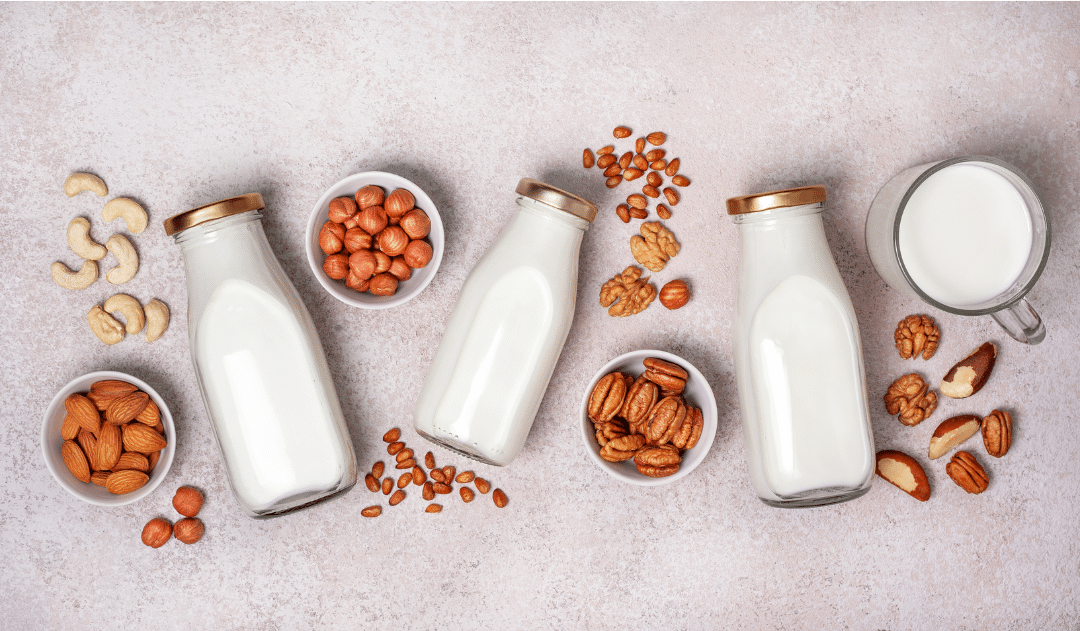Milk alternatives continue to rise in popularity. Whether it is due to allergies, intolerances, sustainability, or simply personal preferences, many people choose plant-based milk alternatives as their milk of choice. The ever-growing plant-based milk alternative category at the grocery store has made what was once a simple decision much more complicated. Our Milk Alternative Nutrition Comparison is here to help make your decision easy.
When shopping for a plant-based milk alternative, key information to look for on the nutrition label includes protein and sugar content. This differs between brands, flavours, and sweetened versus unsweetened options. In addition, look for fortified milk alternatives with added calcium, vitamin D, and vitamin B12, as these more closely resemble the micronutrient content of cow’s milk.
Milk Alternative Nutrition Comparison Chart
| Product name | Calories | Fat (g) | Saturated (g) | Carbohydrate (g) | Fibre (g) | Sugar (g) | Protein (g) | Sodium (mg) | Potassium (mg) | Calcium (mg) | Vit D (mcg) | B12 (mcg) | Iron (mg) |
|---|---|---|---|---|---|---|---|---|---|---|---|---|---|
| Cow's Milk, 3.25% | 157 | 8 | 5 | 12 | 0 | 13 | 8 | 111 | 340 | 291 | 2.6 | 1.16 | 0 |
| Cow's Milk, 2% | 129 | 5 | 3 | 12 | 0 | 13 | 8 | 121 | 361 | 309 | 2.6 | 1.37 | 0 |
| Cow's Milk, 1% | 108 | 2.5 | 1.5 | 13 | 0 | 13 | 9 | 113 | 387 | 322 | 2.6 | 1.21 | 0 |
| Cow's Milk, skim | 88 | 0 | 0 | 13 | 0 | 13 | 9 | 109 | 404 | 316 | 2.6 | 1.29 | 0 |
| Soy Milk (unsweetened) | 90 | 4.5 | 0.5 | 4 | 2 | 1 | 8 | 90 | 350 | 300 | 2 | 1 | 1 |
| Almond Milk (unsweetened) | 30 | 2.5 | 0 | 1 | 1 | 0 | 1 | 130 | 175 | 300 | 2 | 1 | 0 |
| Coconut Milk (unsweetened) | 45 | 4.5 | 3.5 | 1 | 0 | 0 | 0 | 30 | 30 | 300 | 2 | 1 | 0.5 |
| Oat Milk (unsweetened) | 70 | 4.5 | 0.5 | 8 | 1 | 0 | 1 | 90 | 175 | 300 | 2 | 1 | 0.5 |
| Cashew Milk (unsweetened) | 25 | 2 | 0.5 | 1 | 0 | 0 | 1 | 160 | 30 | 300 | 2 | 1 | 0.5 |
| Hazelnut Milk (unsweetened) | 90 | 9 | 0.5 | 1 | 0 | 1 | 2 | 5 | 105 | 24 | 0 | N/A | 1 |
| Walnut Milk (unsweetened) | 120 | 11 | 1 | 1 | 0 | 0 | 3 | 5 | 77 | 24 | 0 | N/A | 0 |
| Macadamia Milk (unsweetened) | 40 | 3.5 | 0.5 | 0 | 0 | 0 | 1 | 100 | 0 | 300 | 2 | 1 | 0 |
| Flax Milk (unsweetened) | 45 | 3 | 0 | 4 | 4 | 0 | 2 | 80 | 49 | 22 | 0 | N/A | 0 |
| Rice Milk (unsweetened) | 60 | 2.5 | 0 | 10 | 0 | 0 | 0 | 105 | 10 | 130 | 4.8 | 1.1 | 0 |
| Hemp Milk (unsweetened) | 60 | 4.5 | 0 | 0 | 0 | 0 | 3 | 110 | 100 | 260 | 2 | N/A | 1.5 |
| Pea Milk (unsweetened) | 80 | 4.5 | 0.5 | 0 | 0 | 0 | 8 | 125 | 405 | 440 | 6 | 2.5 | 2.5 |
| Chickpea Milk (unsweetened) | 70 | 2.5 | 0 | 2 | 0 | 0 | 10 | 125 | 30 | 400 | 2 | 1 | 2 |
Note: the same brand is used here to compare the nutrition information for consistency where possible. The actual nutrition content of milk may vary depending on the brand. Always read the label for the most up-to-date nutrition information. The advice provided here is for the purpose of education and is not medical advice. Always consult with your dietitian or health care provider for dietary advice for managing specific health conditions.
Almond Milk
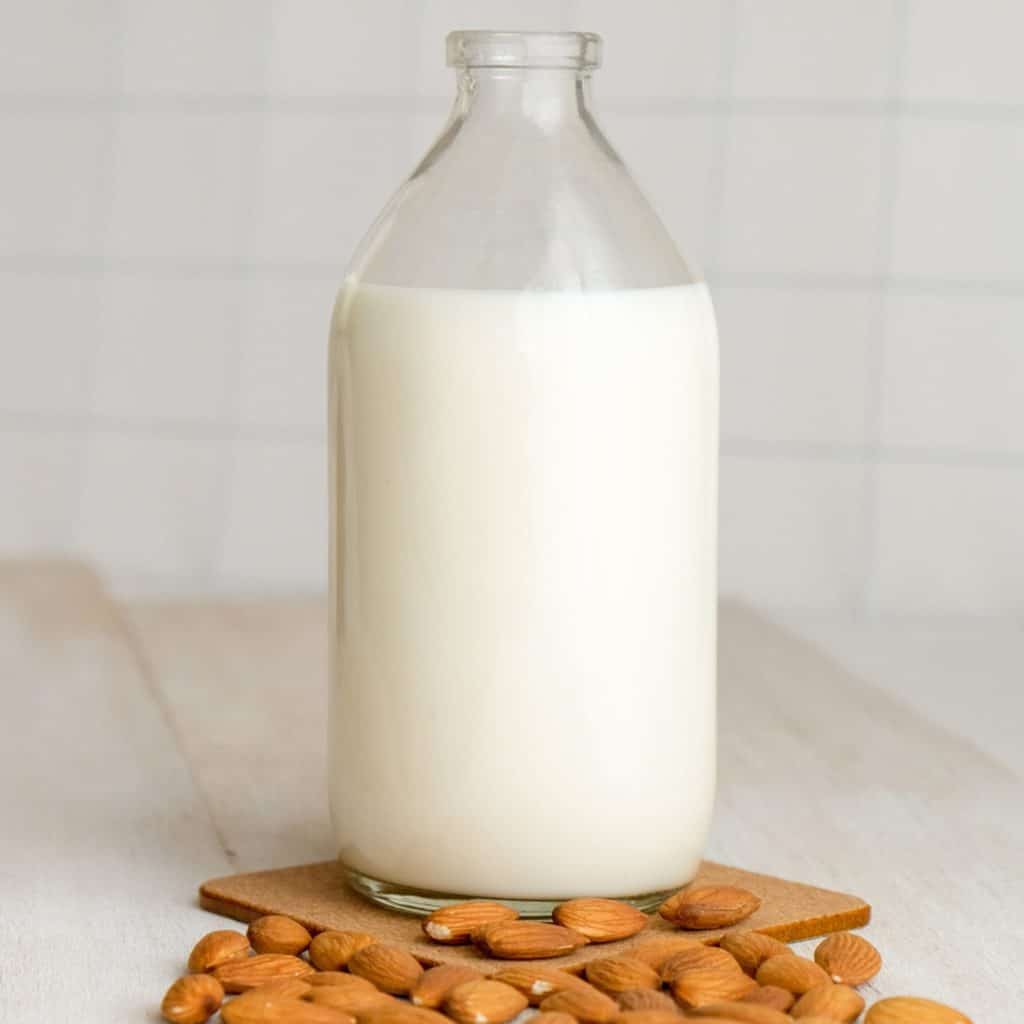
Almond milk has been a popular plant-based milk alternative for years, and a variety of brands are available on the market. It is made by heating and grinding almonds in a water solution, then separating the solids from the liquid milk. There are sweetened and unsweetened versions, flavoured options, and brands with added protein. Almond milk is also available fortified (with additional calcium, vitamin D, B12) and unfortified.
Almond milk nutrition
The nutrition content of almond milk can vary depending on the brand, whether or not it is fortified, or sweetened. One cup of unsweetened, fortified almond milk contains:
Calories: 30 calories
Fat: 3g
Saturated fat: 0g
Carbohydrates: 1g
Fibre: 1g
Sugar: 0g
Protein: 1g
Sodium: 130mg
Potassium: 175mg
Calcium: 300mg
Vitamin D: 2mcg
B12: 1mcg
Iron: 0mg
Almond milk pros:
- Source of calcium (fortified only)
- Source of vitamin D (fortified only)
- Source of B12 (fortified only)
- Low in sugar (unsweetened)
Almond milk cons:
- Low in protein (unless there is an added protein source)
- Not suitable for those with nut allergies
Almond Milk Vs. Cows Milk
Fortified almond milk contains comparable micronutrient content to cow’s milk. Almond milk is much lower in protein than cow’s milk (1g vs. 8g per 1 cup) and also contains fewer carbohydrates and sugar than cow’s milk.
Soy Milk
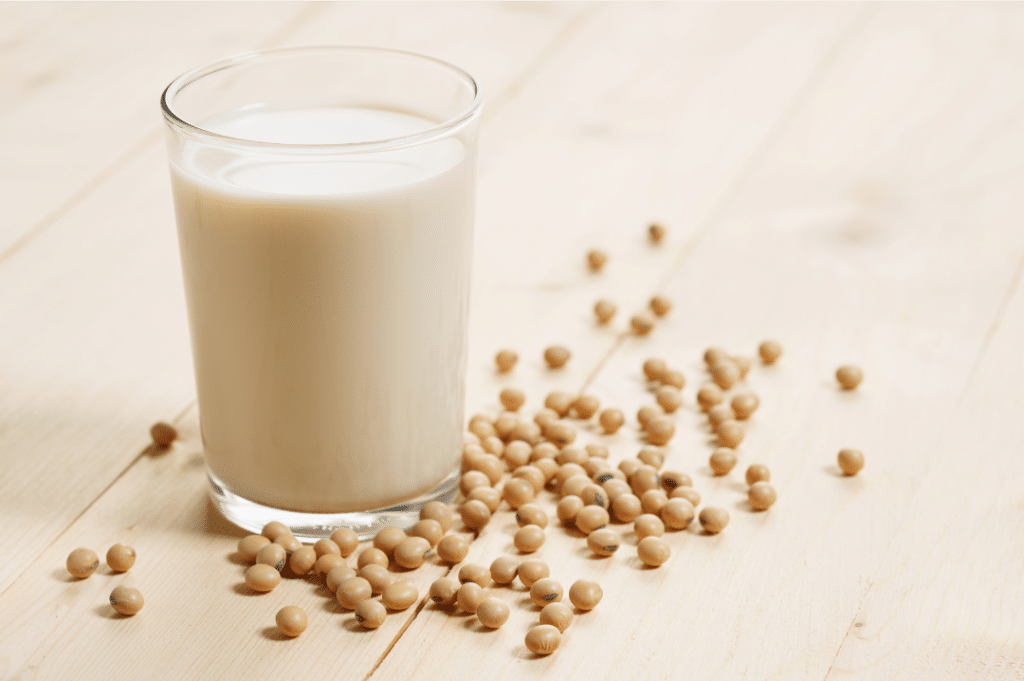
Soy has also been a popular milk alternative for years. It is made by soaking soybeans in water, followed by grinding and spinning the beans to separate the solids from the liquids. There are many different brands of soy milk sold at the grocery store. Soy milk is available sweetened and unsweetened, as well as flavoured. Soy milk is also available fortified (with additional calcium, vitamin D, B12) and unfortified.
Soy Milk Nutrition
The nutrition content of soy milk varies depending on the brand, whether or not it is fortified, or sweetened. One cup of unsweetened, fortified soy milk contains:
Calories: 90
Fat: 4.5g
Saturated fat: 0.5g
Carbohydrate: 4g
Fibre: 2g
Sugar: 1g
Sodium: 90mg
Potassium: 350mg
Calcium: 300mg
Vitamin D: 2mcg
B12: 1mcg
Iron: 1mg
Soy milk pros:
- Source of protein
- Source of calcium (fortified only)
- Source of vitamin D (fortified only)
- Source of B12 (fortified only)
- Low in sugar (unsweetened)
Soy milk cons:
- Soy is a common allergen so soy milk may not be suitable for everyone
Soy Milk vs. Cows Milk
Compared to cow’s milk, soy milk has a similar protein content. Fortified soy milk also has similar micronutrient content as cow’s milk. Unsweetened soy milk is lower in carbohydrates and sugar than cow’s milk.
Milk Alternative Nutrition Comparison
Coconut Milk
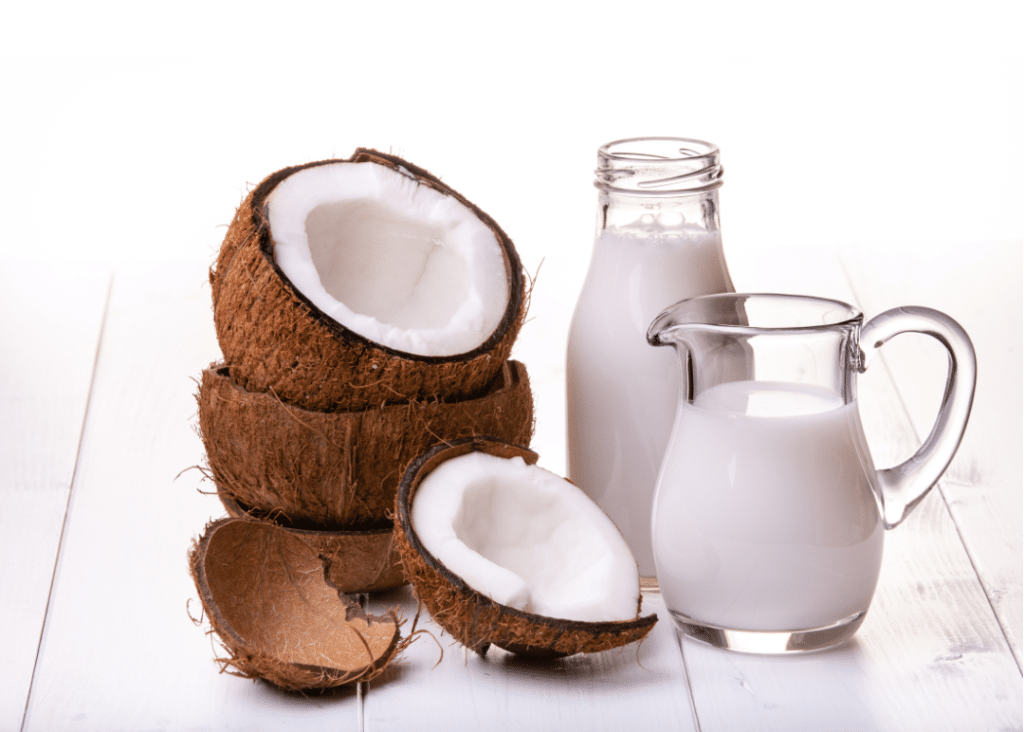
Coconut milk is another popular milk alternative. It is made by shredding and pressing coconut meat to produce liquid milk. There are two forms of coconut you’ll commonly find at the grocery store – canned and ‘beverage’ coconut milk. Canned coconut milk is most often used for cooking or baking, while the beverage formula (included here) is often lower in fat and formulated specifically for drinking. Beverage-formulated coconut milk is available sweetened, unsweetened, and flavoured. Coconut milk is also available fortified (with additional calcium, vitamin D, B12) and unfortified.
Coconut Milk Nutrition
The nutrition content of coconut milk varies depending on the brand, whether or not it is fortified, or sweetened. One cup of unsweetened, fortified coconut milk contains:
Calories: 45
Fat: 4.5
Saturated fat: 3.5
Carbohydrate: 1g
Fibre: 0g
Sugar: 0g
Sodium: 30mg
Potassium: 30mg
Calcium: 300mg
Vitamin D: 2mcg
B12: 1mcg
Iron: 0.5g
Coconut milk pros:
- Source of calcium (fortified only)
- Source of vitamin D (fortified only)
- Source of B12 (fortified only)
- Low in sodium
- Sugar-free (unsweetened)
- Suitable for those following a low-potassium diet
Coconut milk cons:
- Low in protein
- Source of saturated fat
Coconut Milk vs. Cows Milk
Fortified coconut milk has comparable calcium, vitamin D, and B12 content to cow’s milk, and the fat content is similar to 2% cow’s milk. Coconut milk is much lower in protein, carbohydrate, sodium, and potassium than cow’s milk.
Oat Milk
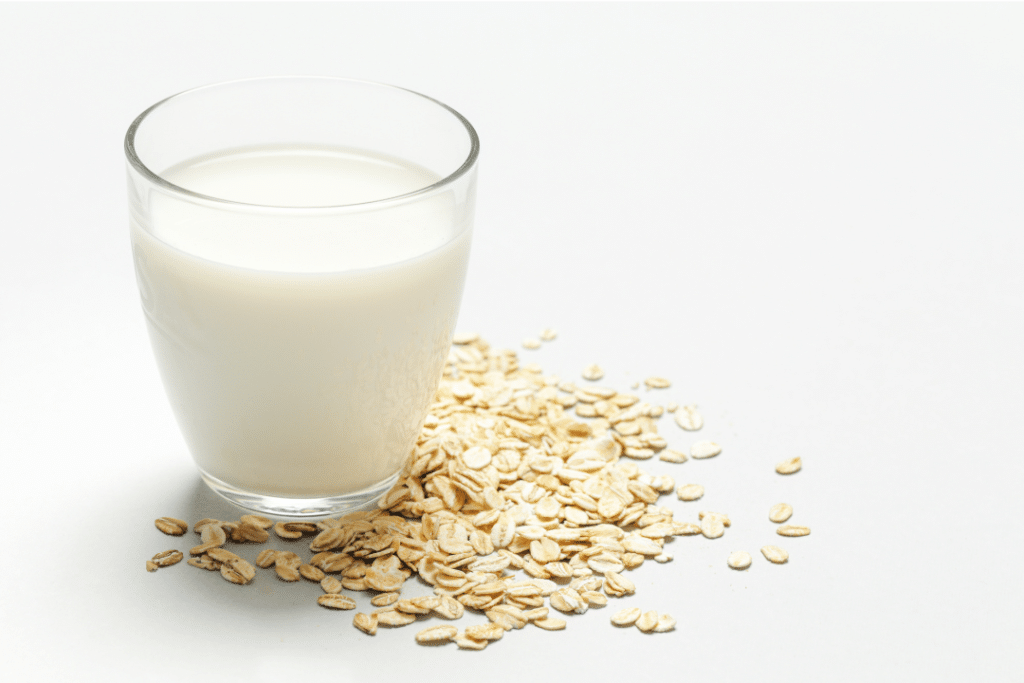
Oat milk is a widely available milk alternative that has increased in popularity in recent years. Oat milk is made by extracting fats and protein from oats and processing them with water and salt. There are a number of brands on the market that sell oat milk, and it is available sweetened, unsweetened, and flavoured. Oat milk is also available fortified (with additional calcium, vitamin D, B12) and unfortified.
Oat Milk Nutrition
The nutrition content of oat milk varies depending on the brand, whether or not it is fortified, or sweetened. One cup of unsweetened, fortified oat milk contains:
Calories: 70
Fat: 4.5
Saturated fat: 0.5
Carbohydrates: 8g
Fibre: 1g
Sugar: 0g
Protein: 1g
Sodium: 90mg
Potassium: 175mg
Calcium: 300mg
Vitamin D: 2mcg
Vitamin B12: 1mcg
Iron: 0.5mcg
Oat Milk Pros:
- Source of calcium (fortified only)
- Source of vitamin D (fortified only)
- Source of B12 (fortified only)
- Sugar-free (unsweetened)
- Allergen-friendly (though some may contain gluten)
Oat Milk Cons:
- Low in protein (unless there is an added protein source)
Oat Milk vs. Cows Milk
Compared to cow’s milk, fortified oat milk has similar sodium, calcium, B12, and vitamin D content. Oat milk is lower in protein and carbohydrates compared to cow’s milk.
Rice Milk
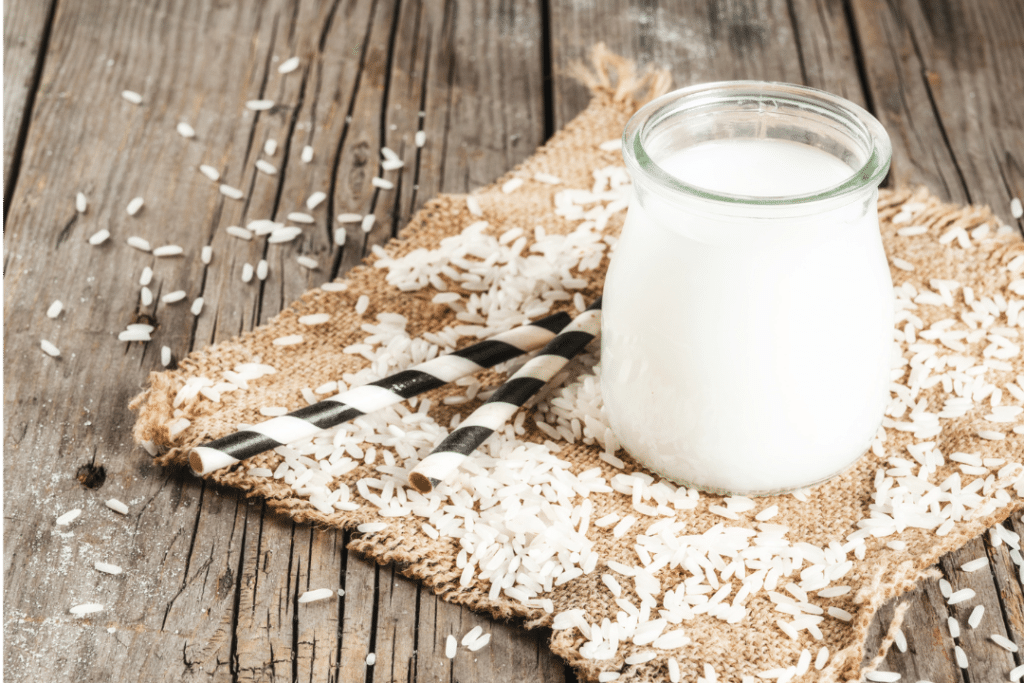
Rice milk has been available for years as a milk alternative. It is a popular option among individuals with multiple allergies as it is free from nuts, dairy, and soy. Rice milk is available sweetened, unsweetened, and flavoured. You can also find rice milk that is fortified (with extra calcium, vitamin D, B12) or unfortified.
Rice Milk Nutrition
The nutrition content of rice milk varies depending on the brand, whether or not it is fortified, or sweetened. One cup of unsweetened, fortified rice milk contains:
Calories: 60
Fat: 2.5g
Saturated fat: 0g
Carbohydrates: 10g
Fibre: 0g
Sugar: 0g
Protein: 0g
Sodium: 105mg
Potassium: 10mg
Calcium: 130mg
Vitamin D: 5mcg
Vitamin B12: 1mcg
Iron: 0mcg
Rice milk pros:
- Source of calcium (fortified only)
- Source of vitamin D (fortified only)
- Source of B12 (fortified only)
- Allergen-friendly
- Sugar-free (unsweetened)
- Suitable for those following a low potassium diet
Rice Milk cons:
- Low in protein
Rice Milk vs. Cows Milk
Similar to cow’s milk, fortified rice milk is a source of calcium, vitamin D, and B12. However, rice milk is lower in protein than cow’s milk. The total carbohydrate content of rice milk is similar to cow’s milk, but rice milk has 0g of sugar, while cow’s milk contains 13g of sugar per serving.
Milk Alternative Nutrition Comparison
Cashew Milk
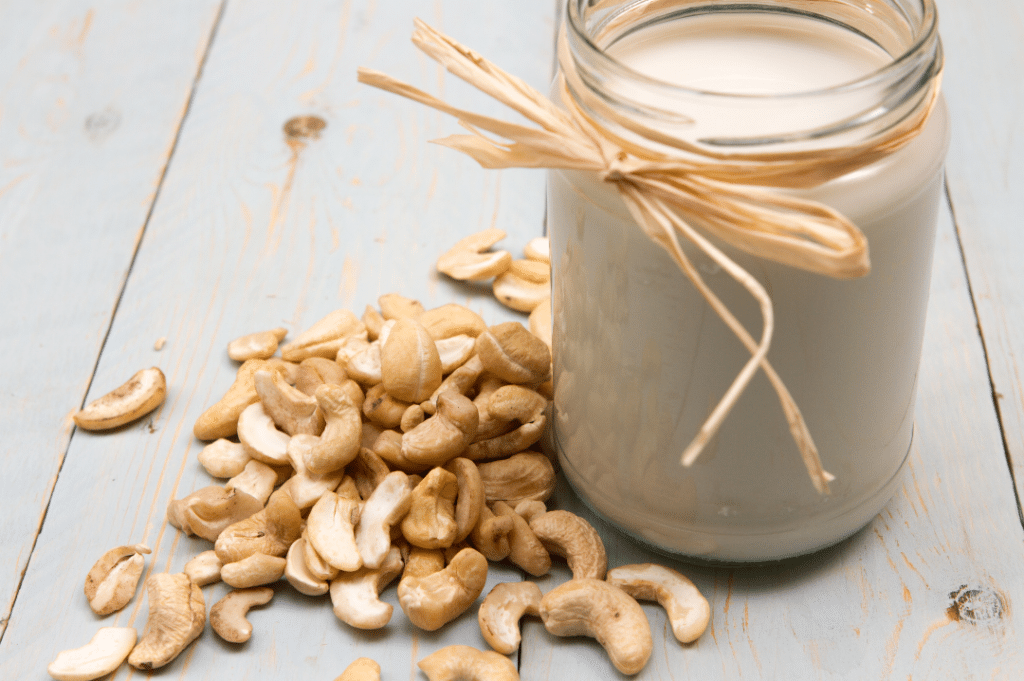
While not as popular as almond milk, Cashew milk is another option for those looking for a dairy milk alternative. To make Cashew Milk, cashews are soaked in hot water, milled to produce a slurry, and filtered to remove solids. Cashew milk is available sweetened, unsweetened, and flavoured. You can also find cashew milk that is fortified (with extra calcium, vitamin D, B12) or unfortified.
Cashew Milk Nutrition
The nutrition content of cashew milk varies depending on the brand, whether or not it is fortified, or sweetened. One cup of unsweetened, fortified cashew milk contains:
Calories: 25
Fat: 2g
Saturated fat: 0.5g
Carbohydrates: 1g
Fibre: 0g
Sugar: 0g
Protein: 1g
Sodium: 105mg
Potassium: 30mg
Calcium: 300mg
Vitamin D: 2mcg
Vitamin B12: 1mcg
Iron: 0.5mcg
Cashew milk pros:
- Source of calcium (fortified only)
- Source of vitamin D (fortified only)
- Source of B12 (fortified only)
- Sugar-free (unsweetened)
- Suitable for low potassium diet
Cashew milk cons:
- Low in protein (unless there is an added protein source)
- Not suitable for those with nut allergies
Cashew Milk vs. Cows Milk
Fortified cashew milk has a similar micronutrient content to cow’s milk, but cashew milk is much lower in protein than cow’s milk. Cashew milk is also lower in carbohydrates than cow’s milk, with 1g vs. 13g, respectively.
Macadamia Milk

While not as commonly available as some other milk alternatives, Macadamia milk is another type of plant-based milk alternative you may find at the grocery store. At the time of this review, only one brand carries macadamia milk. It is available fortified (with additional calcium, vitamin D, and B12) and with unsweetened, sweetened, and flavoured options.
Macadamia Milk Nutrition
The nutrition content of macadamia milk varies depending on whether or not it is fortified, unsweetened, or sweetened. One cup of unsweetened, fortified macadamia milk contains:
Calories: 40
Fat: 3.5g
Saturated fat: 0.5g
Carbohydrates: 0g
Fibre: 0g
Sugar: 0g
Protein: 1g
Sodium: 100mg
Potassium: 0mg
Calcium: 300mg
Vitamin D: 2mcg
Vitamin B12: 1mcg
Iron: 0mcg
Macadamia milk pros:
- Source of calcium (fortified only)
- Source of vitamin D (fortified only)
- Source of B12 (fortified only)
- Sugar-free (unsweetened)
- Suitable for those following a low-potassium diet
Macadamia milk cons:
- Low in protein
- May not be suitable for those with nut allergies
Macadamia Milk vs. Cows Milk
Fortified macadamia milk has a comparable micronutrient content to cows milk, however, macadamia milk is much lower in protein than cows milk. Macadamia milk is also lower in carbohydrates compared to cow’s milk, with 0g vs. 13g, respectively.
Hemp Milk
Hemp Milk is a newer type of milk alternative on the market. As such, few brands carry hemp milk. Hemp milk is made by grinding hemp seeds with hot water into a smooth product resembling a milk consistency. Hemp milk is available fortified (with additional calcium, vitamin D, and B12) and with unsweetened, sweetened, and flavoured options.
Hemp Milk Nutrition
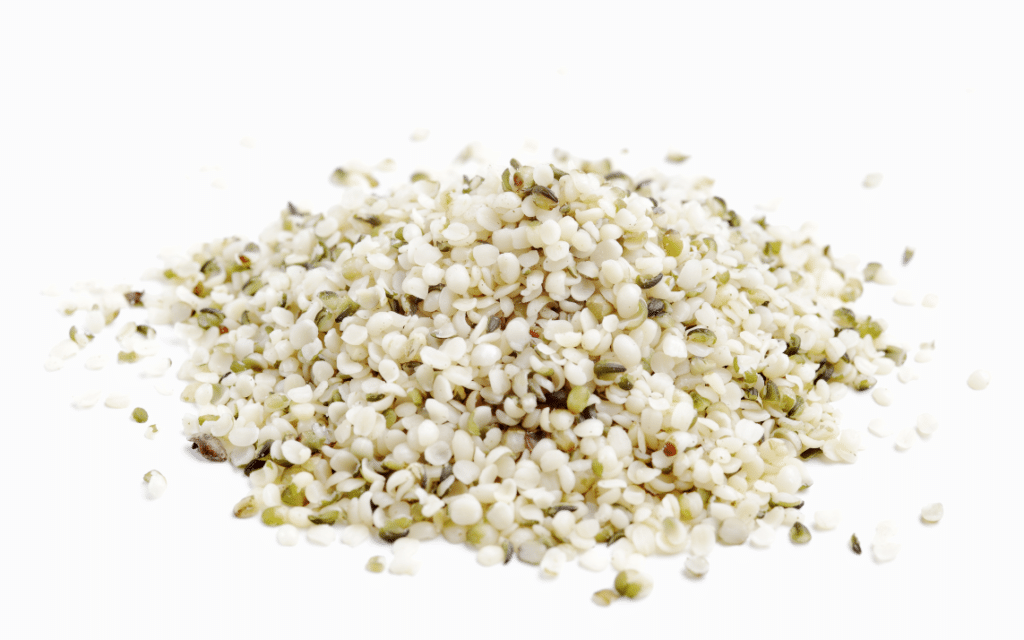
The nutrition content of hemp milk varies depending on the brand, whether or not it is fortified, or sweetened. One cup of unsweetened, fortified hemp milk contains:
Calories: 60
Fat: 4.5g
Saturated fat: 0g
Carbohydrates: 0g
Fibre: 0g
Sugar: 0g
Protein: 3g
Sodium: 110mg
Potassium: 100mg
Calcium: 260mg
Vitamin D: 2mcg
Vitamin B12: N/A
Iron: 1.5mcg
Hemp milk pros:
- Source of calcium (fortified only)
- Source of vitamin D (fortified only)
- Source of unsaturated fats
- Sugar-free (unsweetened)
Hemp milk cons:
- Low in protein
- May not be a source of B12 (depending on the brand)
Hemp Milk vs. Cows Milk
Fortified hemp milk has a comparable calcium and vitamin D content to cow’s milk, however, hemp milk is much lower in protein than cow’s milk. Hemp milk is also lower in carbohydrates than cow’s milk, with 0g vs. 13g, respectively.
Flax Milk
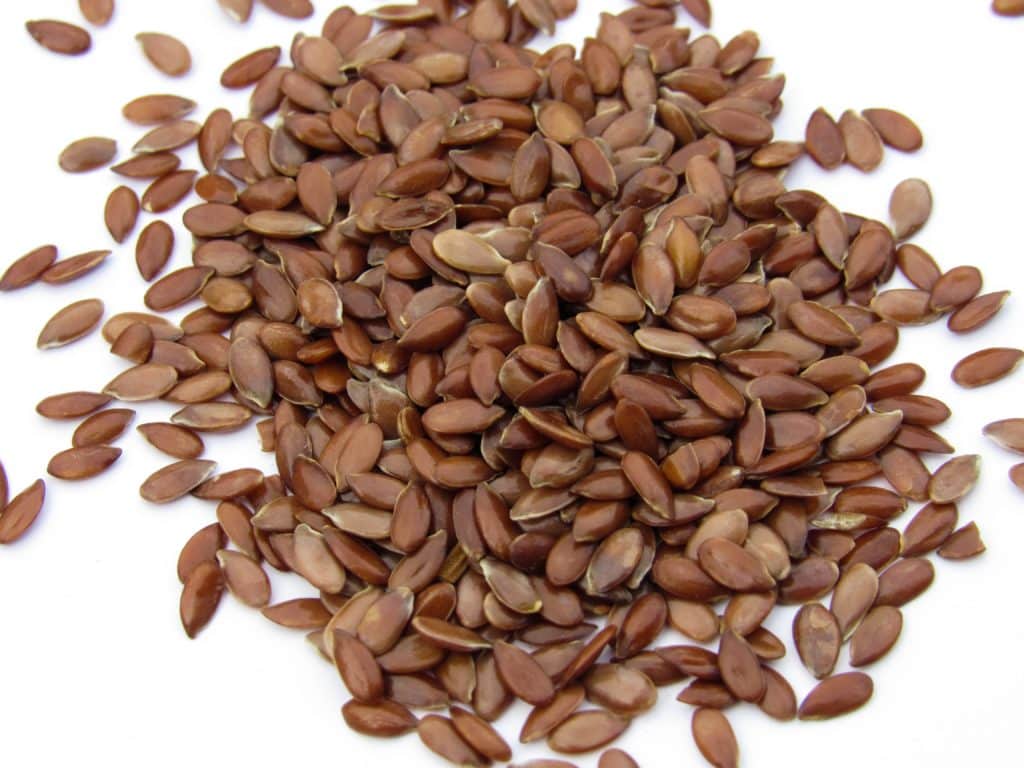
Flax Milk is a newer milk alternative on the market. As such, few brands carry flax milk. Flax milk is available sweetened, unsweetened, and flavoured. Most flax milk products are unfortified (used here), however, there is one brand that is fortified with additional micronutrients and pea protein.
Flax Milk Nutrition
The nutrition content of flax milk varies depending on the brand, whether or not it is fortified, or sweetened. One cup of unsweetened, non-fortified flax milk contains:
Calories: 45
Fat: 3g
Saturated fat: 0g
Carbohydrates: 4g
Fibre: 4g
Sugar: 0g
Protein: 1g
Sodium: 80mg
Potassium: 49mg
Calcium: 22mg
Vitamin D: 0mcg
Vitamin B12: N/A
Iron: 0mcg
Flax milk pros:
- Source of unsaturated fats
- Source of fibre
- Suitable for those following a low-potassium diet
Flax milk cons:
- Low in protein
- Low in calcium compared to other milk alternatives
- Does not contain vitamin D
- Does not contain iron
Flax Milk vs. Cows Milk
There are a limited number of fortified flax milk products on the market. Unless fortified, flax milk is not a source of calcium, B12, or vitamin D compared to cow’s milk. Flax milk is also lower in protein. However, flax milk is a source of unsaturated fats and fibre, unlike cow’s milk.
Milk Alternative Nutrition Comparison
Pea Milk
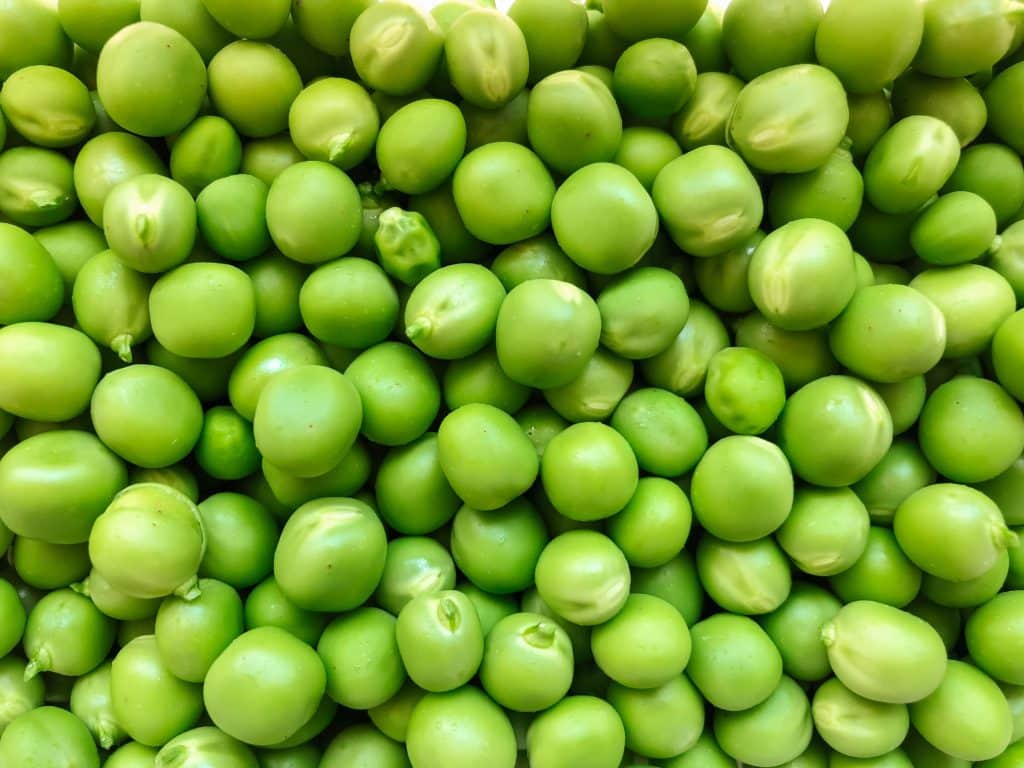
There are a limited number of brands on the market formulated as pea milk. Pea milk is available sweetened, unsweetened, and flavoured. You can also find pea milk that is fortified (with extra calcium, vitamin D, B12) or unfortified.
Pea Milk Nutrition
The nutrition content of pea milk varies depending on the brand, whether or not it is fortified, or sweetened. One cup of unsweetened, fortified pea milk contains:
Calories: 80
Fat: 4.5g
Saturated fat: 0.5g
Carbohydrates: 0g
Fibre: 0g
Sugar: 0g
Protein: 8g
Sodium: 125mg
Potassium: 405mg
Calcium: 440mg
Vitamin D: 6mcg
Vitamin B12: 2.5mcg
Iron: 2.5mcg
Pea milk pros:
- Source of calcium (fortified only)
- Source of vitamin D (fortified only)
- Source of B12 (fortified only)
- Source of iron
- Source of protein
- Sugar-free (unsweetened)
Pea Milk cons:
- May not be suitable for some individuals with a legume allergy
Pea Milk vs. Cows Milk
Compared to cow’s milk, pea milk has a similar protein content. The micronutrient content varies depending on the level of fortification, but fortified pea milk has similar micronutrient content as cow’s milk. In addition, pea milk is a source of iron.
Hazelnut Milk
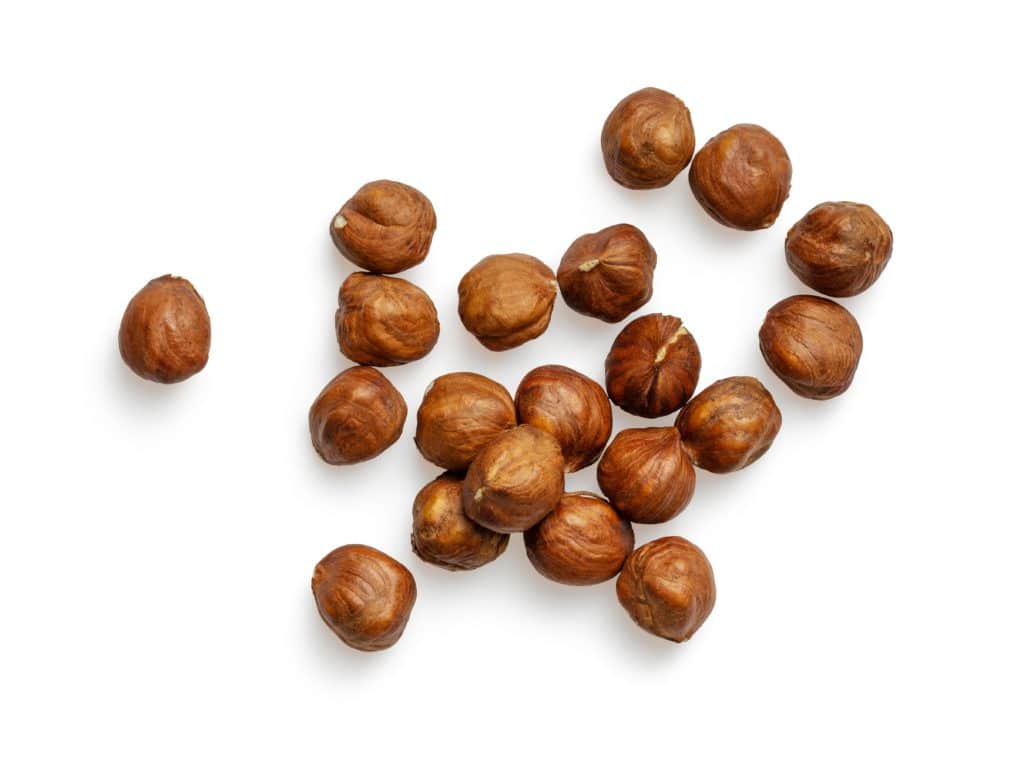
Hazelnut milk is an example of a nut-based milk slowly emerging into the market. At the point of this comparison, one Hazelnut milk brand exists on the market, which is not fortified.
Hazelnut Milk Nutrition
One cup of unsweetened, non-fortified hazelnut milk contains:
Calories: 90
Fat: 9g
Saturated fat: 0.5g
Carbohydrates: 1g
Fibre: 0g
Sugar: 1g
Protein: 2g
Sodium: 5mg
Potassium: 105mg
Calcium: 24mg
Vitamin D: 0mcg
Vitamin B12: N/A
Iron: 1mcg
Hazelnut milk Pros:
- Source of unsaturated fats
- Low in sugar
Hazelnut milk cons:
- Low in protein
- Not a significant source of calcium, vitamin D, or B12 (non-fortified)
- May not be suitable for those with nut allergies
- Limited availability
Hazelnut Milk vs Cows Milk
At the time of this comparison, we are unable to find hazelnut milk on the market that is fortified. Therefore, hazelnut milk is not a source of calcium, B12, or vitamin D compared to cow’s milk. Hazelnut milk is also lower in protein. However, hazelnut milk is a better source of unsaturated fats than cow’s milk.
Walnut Milk
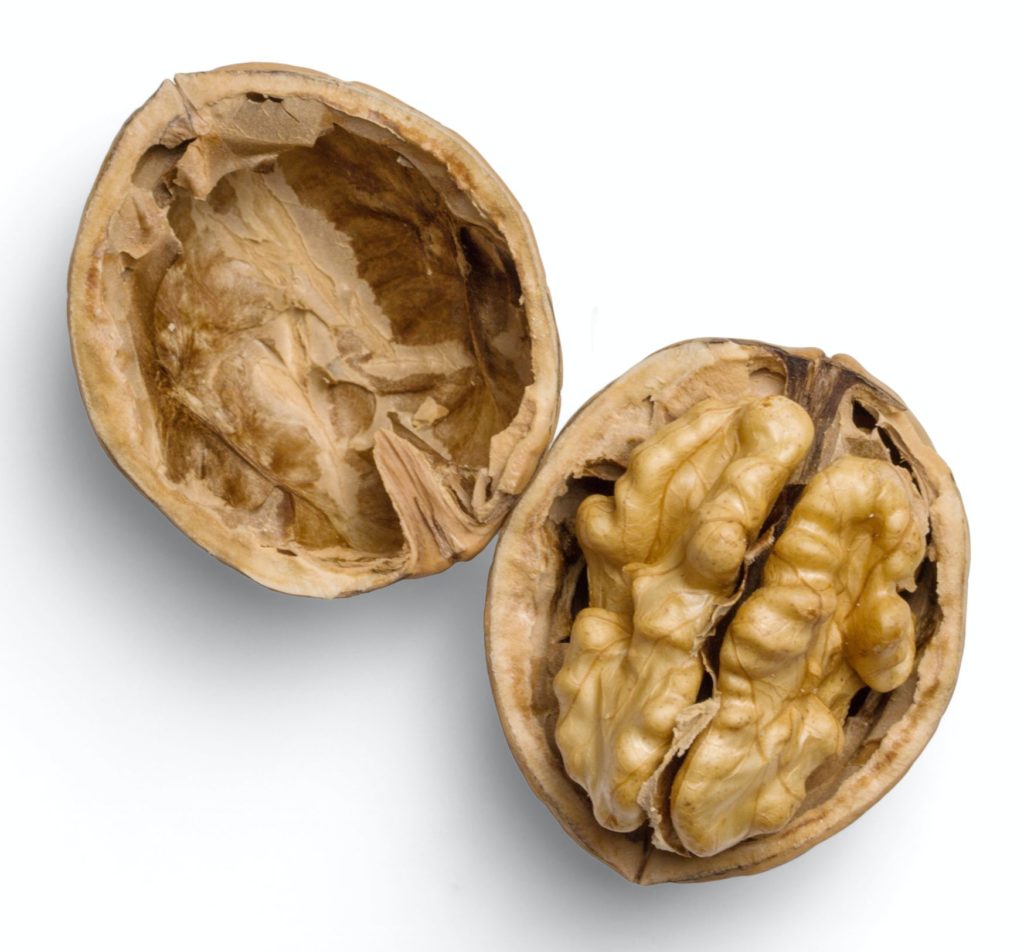
Walnut milk is another less-popular milk alternative. At the time of this comparison, one walnut milk brand is available on the market, which is not fortified.
Walnut Milk Nutrition
One cup of unsweetened, non-fortified walnut milk contains:
Calories: 120
Fat: 11g
Saturated fat: 1g
Carbohydrates: 1g
Fibre: 0g
Sugar: 0g
Protein: 3g
Sodium: 5mg
Potassium: 77mg
Calcium: 24mg
Vitamin D: 0mcg
Vitamin B12: N/A
Iron: 0mcg
Walnut milk pros:
- Source of unsaturated fats
- Low in sugar
- Low sodium
Walnut milk cons:
- Not a significant source of calcium, vitamin D, or B12 (non-fortified)
- Low in protein
- May not be suitable for some individuals with a nut allergy
- Limited availability
Walnut Milk vs. Cows Milk
At the time of this comparison, we are unable to find walnut milk on the market that is fortified. Therefore, walnut milk is not a source of calcium, B12, or vitamin D compared to cows milk. Hazelnut milk is also lower in protein. However, walnut milk is higher in unsaturated fats than cow’s milk.
Chickpea Milk

A newer plant-based milk alternative comes from chickpeas. While this is not as common as other types of plant-based milk alternatives, the growing popularity of chickpeas and other pulses in the food industry means you may start seeing more chickpea-based milk on the market. Chickpea milk is available fortified, sweetened, unsweetened, and flavoured.
Chickpea milk nutrition
The nutrition content of chickpea milk varies depending on the brand, whether or not it is fortified, or sweetened. One cup of unsweetened, fortified chickpea milk contains:
Calories: 70
Fat: 2.5g
Saturated fat: 0g
Carbohydrates: 2g
Fibre: 0g
Sugar: 0g
Protein: 10g
Sodium: 125mg
Potassium: 30mg
Calcium: 400mg
Vitamin D: 2mcg
Vitamin B12: 1mcg
Iron: 2mcg
Chickpea milk pros:
- Source of calcium (fortified only)
- Source of vitamin D (fortified only)
- Source of B12 (fortified only)
- Source of iron
- Source of protein
- Suitable for those following a low-potassium diet
Chickpea milk cons:
- Limited availability
Chickpea milk vs. Cow’s Milk
Compared to cow’s milk, chickpea milk has a similar protein content. The micronutrient content varies depending on the level of fortification, however, fortified chickpea milk has similar micronutrient content as cow’s milk. In addition, chickpea milk is a source of iron.
Frequently Asked Questions
What is the best milk alternative?
Determining which dairy milk alternative is the best option will vary on individual needs and preferences. Generally speaking, the best milk alternative is fortified and provides a source of protein, as this would best replace the nutrition found in cow’s milk. Soy milk, pea milk, and chickpea milk are available fortified with calcium, vitamin D, and B12 and are naturally a source of protein, with 8-10g per cup. In addition, several brands carry almond and oat milk with added protein which makes them complete replacements for cow’s milk.
What is the best nut milk?
When choosing between almond, cashew, hazelnut, macadamia, and walnut milk, there are a few things to consider. First, since hazelnut and walnut milk are less common, there are not as many fortified options available at this time. Almond, cashew, and macadamia milk are all available fortified with additional calcium, vitamin D, and B12, making them suitable replacements for the micronutrients found in cow’s milk. The nutrient content of fortified almond, cashew, and macadamia milk is very similar, so the best option comes down to personal preference.
What is the highest protein milk alternative?
The highest protein milk alternative is chickpea milk, with 10g of protein per cup. Soy milk and pea milk are also a source of protein, with 8g per cup. Almond and oat milk are not naturally high in protein, however, several brands carry these varieties with added protein which provide 8-10g of protein per cup, depending on the brand.
What is the lowest-calorie alternative milk?
The lowest calorie milk alternative is unsweetened cashew milk, with 25 calories per 1 cup.
What’s the difference between almond milk vs. soy milk?
The main difference between almond milk and soy milk is the protein content. Soy milk naturally contains 8g of protein per cup, compared to 1g per cup of almond milk.
Is oat milk or almond milk better for you?
Fortified oat and almond milk contain similar calcium, vitamin D, and B12, making them comparable options. In some cases, oat milk is a higher protein option. While almond milk contains 1g of protein per cup, oat milk contains 1-4g per cup, depending on the brand.
What’s the difference between cashew milk vs. almond milk?
Cashew and almond milk are available fortified with similar levels of additional calcium, vitamin D, and B12. The calorie, fat, protein, and carbohydrate content is also similar. The biggest difference is in the potassium content. Cashew milk is lower in potassium than almond milk, with 30mg and 175mg, respectively.
Is coconut milk better than almond milk?
Coconut and almond milk are available fortified with similar amounts of calcium, vitamin D, and B12. Neither coconut nor almond milk is a significant source of protein and carbohydrates. Coconut milk is higher in saturated fats, making it a less desirable option for some consumers.
What’s the difference between macadamia milk vs. almond milk?
There is no significant difference in the nutrient content of fortified macadamia and almond milk. Both contain similar calcium, vitamin D, B12, protein, carbohydrate, and fat amounts.
What’s better soy milk vs. oat milk?
Both soy and oat milk are available fortified with calcium, vitamin D, and B12. Soy milk is higher in protein, with 8g per cup compared to 1-4g per cup of oat milk, making it a closer replacement to cow’s milk.
Sources:
- Sethi, S., Tyagi, S. K., & Anurag, R. K. (2016). Plant-based milk alternatives an emerging segment of Functional Beverages: A Review. Journal of Food Science and Technology, 53(9), 3408–3423.
- Almond Milk Nutrition Facts, Silk Almond Milk Original Unsweetened.
- Snyder, H. E., & Wilson, L. A. (2003). Soy (soya) beans | processing for the food industry. Encyclopedia of Food Sciences and Nutrition, 5383
- HAGENMAIER, R. O. B. E. R. T., CATER, C. A. R. L. M., & MATTIL, K. A. R. L. F. (1973). Aqueous processing of fresh coconuts for recovery of oil and coconut skim milk. Journal of Food Science, 38(3), 516–518.
- Soy Milk Nutrition Facts, Silk Soy Milk Original Unsweetened.
- Coconut Milk Nutrition Facts, Silk Coconut Milk Unsweetened Original
- Decker, E. A., Rose, D. J., & Stewart, D. (2014). Processing of oats and the impact of processing operations on nutrition and health benefits. British Journal of Nutrition, 112(S2).
- Oat Milk Nutrition Facts, Silk Unsweetened Oat Milk
- Rice Milk Nutrition Facts, Rice Dream Unsweetened Enriched Milk
- Manzoor, Muhammad. (2017). Nutritional and Sensory Properties of Cashew Seed (Anacardium occidentale) Milk. Modern Concepts & Developments in Agronomy. 1. 10.31031/MCDA.2017.01.000501.
- Cashew Milk Nutrition Facts, Silk Unsweetened Cashew Milk
- Google. (n.d.). US20080241339A1 – hemp food product base and processes. Google Patents. Retrieved March 23, 2023, from https://patents.google.com/patent/US20080241339A1/en
- Macadamia Milk Nutrition, Milkadamia Unsweetened Macadamia Milk.
- Hemp Milk Nutrition, Pacific Foods Hemp Milk Unsweetened.
- Flax Milk Nutrition, Malibu Mylk unsweetened.
- Pea Milk Nutrition, Ripple Unsweetened Original.
- Hazelnut Milk Nutrition, Elmhurst Hazelnut Milk.
- Walnut Milk Nutrition, Elmhurst Walnut Milk.
- Chickpea Milk Nutrition, Yofiit Chickpea Milk.
- Canadian Nutrient File, Skim Milk, 1% Milk, 2% milk, 3.25% milk. Accessed June 14, 2023.

